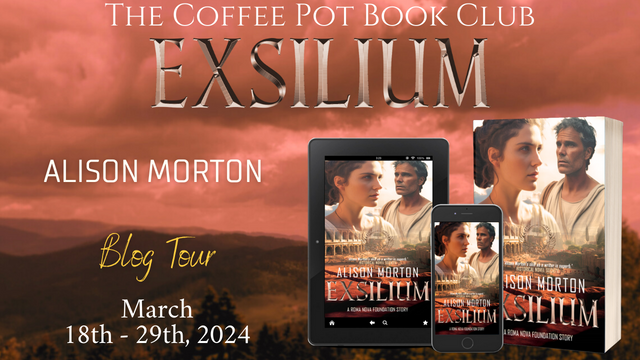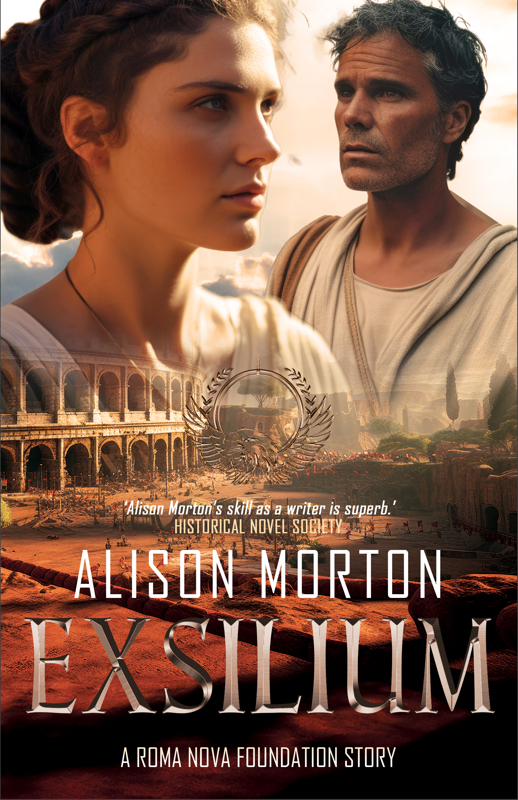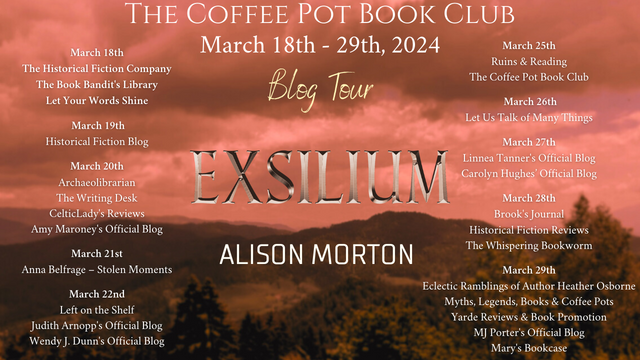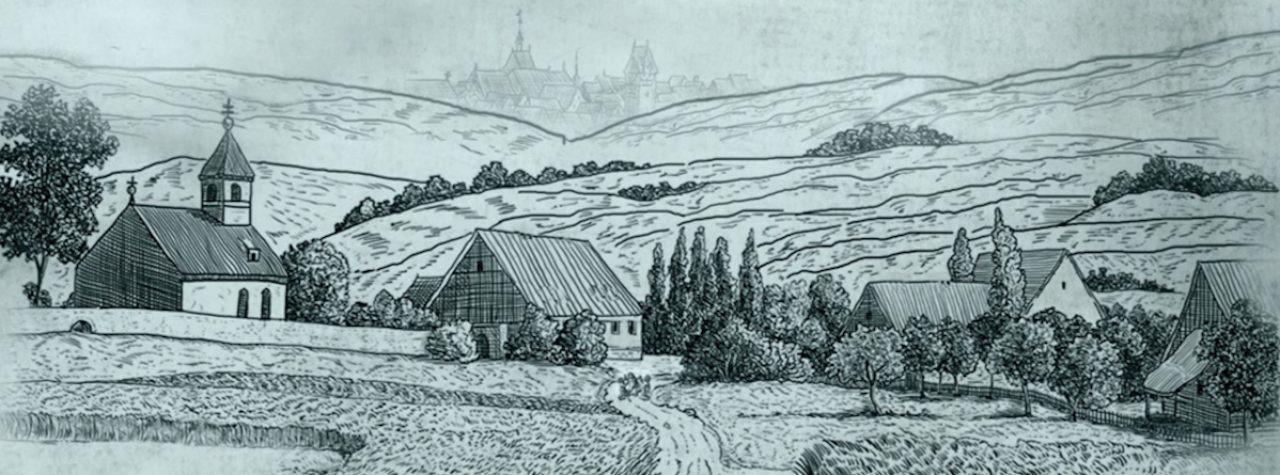Last year, in April, I shared the celebration of the 1oth publication anniversary of ALISON MORTON’s Inceptio, the first book in her alternative history thriller series, Roma Nova. Today, I am delighted to tell you about the eleventh book in the Roma Nova series, Exsilium, which was published last month. Exsilium is the sequel to Julia Prima, set in the fourth century AD, and continues the origin story behind the modern Roma Nova series.

Find out more about Exsilium below but, first, read a fascinating article from Alison, which discusses both her passion for history, especially Roman history, and how the “history” of Roma Nova came to life.
A historical journey in more than one way
When you acquire a reputation for writing alternative history stories, it can be a surprise, even a shock, to readers when you write ‘standard’ historical fiction.
Let me explain… As a ‘Roman nut’ since the age of eleven, I have a deep interest, possibly an obsession with history, especially Roman history. It led me to go back to university thirty years after I’d first graduated to study for an MA in the field. When the creative writing bug bit me thirteen years ago, I knew there had to be a strong Roman element.
Coupled with that was a desire to write a female lead who drove the story. Roman society was a strongly militarised one with no scope for women soldiers. A dilemma. Then I read Robert Harris’s Fatherland and discovered you could ‘alternate’ history. So liberated, I rewrote history along a slightly different timeline. Enter Carina and Aurelia, 21st and 20th century heroines, both Praetorian Special Forces officers serving in Roma Nova, a tiny remnant of the Roman Empire that survived through history.
The importance of our historical roots
Like any country, Roma Nova has its own history. In our real timeline, who today doesn’t have an older relative who remembers ‘the war’? We know exactly which war they are talking about because it was such a formative experience for that generation and the following one. At school, we learn about 1066, American Independence in 1776, the Battle of Waterloo in 1815 – events long in our past but which have an impact on our minds even today. To give Roma Nova a depth and some collective memory, I invented a history for it with roots in real events in the 4th century. I had no idea that ten years later I would be hoist with my own petard.
Even in the first hundred pages of INCEPTIO, the first Roma Nova thriller set in the 21st century, the characters often refer to their legendary ancestors’ self-exile, so when readers said they were thirsty for more, I knew I had to tell the story.
Is it ever sensible to write a historical prequel?
Writing a prequel after I’d written nine books spanning the late 1960s to the present wasn’t straightforward. The scope for massive blooperdom loomed frighteningly large. Would I be able to remember all the references made by my characters to the distant past? Anxiety central. I sat down with a new legal pad and re-read the whole series, making notes as you would for any research project. And I’m both pleased and relieved I did. Even with our own beloved creations, few of us have a good enough memory to recall everything.
I started relating the Roma Nova foundation story in JULIA PRIMA which was going to tell the story in one book. One book. But as often happens, when I reached halfway through writing the first draft, I discovered there was far too much story for one book, so EXSILIUM was born.
Why this moment in the late 4th century AD?
The timeline divergence for the Roma Nova world was triggered back in AD 395 when Emperor Theodosius finally outlawed any non-Christian religious activity on pain of death. My characters, Maelia, Lucius and Galla, and many of their friends follow the thousand-year traditional Roman religion with Jupiter, Juno and Minerva the most senior gods. Mars and Mercury come close behind in the pantheon.
In EXSILIUM, the verbal and physical violence against non-Christians has intensified. The Christianised Roman state allows no other religion to be practised (even if they argue vociferously amongst themselves about which form of Christianity is the ‘correct’ one). No moment in history is fixed; it has its causes – direct and indirect – and its consequences – short term and long term. Behind the personal stories, this new book shows how the pressure of exclusive and aggressive ideology can drive people to make the stark choice between exile – which Romans considered a living death – or actual physical death by execution.
We hear a great deal about Rome persecuting Christians in the pre-Constantinian period approx. 312 AD, but almost nothing about the Roman state persecution of non-Christians in Late Antiquity.
The research challenge
I’m reasonably familiar with the Roman timeline – people, politics, battles, personal and public environments, occupations, values, the complexity of Roman life – although I did check on many individual things I thought I knew. A great deal has moved on in the centuries since Augustus and Hadrian, from armour and military organisation to clothes, religion and dining arrangements.
Although I researched about trekking horses in the 4th century and knew the ‘no stirrups’ rule, I was a little rocky on the practical aspects of riding horses. So, as with JULIA PRIMA, I consulted historical fiction legend Helen Hollick who owns and breeds horses and has ridden all her life. Other ‘Romans’, such as Ruth Downie, author of the Medicus series, helped on travel and Gordon Doherty sent me a wonderful reading list for the 4th century.
But as I was writing JULIA PRIMA, I discovered to my great delight a magisterial work on Roman Noricum – Julia’s home province and the destination in EXSILIUM. Simply called Noricum, it’s a study by Géza Alföldy from the Ruhr Universität Bochum and University of Heidelberg, and translated by no less than Anthony Birley, a founder trustee of the Vindolanda Trust. But while useful as background for the first book, it came into its own as an invaluable resource for EXSILIUM.
Writing JULIA PRIMA was an energising and enjoyable experience, but EXSILIUM has let me tell not only the characters’ personal ups and downs and the Roma Nova foundation story, but also to introduce readers to this little-known period.
What is Exsilium about?
Exile – Living death to a Roman
AD 395. In a Christian Roman Empire, the penalty for holding true to the traditional gods is execution.
Maelia Mitela, her dead husband condemned as a pagan traitor, leaving her on the brink of ruin, grieves for her son lost to the Christians and is fearful of committing to another man.
Lucius Apulius, ex-military tribune, faithful to the old gods and fixed on his memories of his wife Julia’s homeland of Noricum, will risk everything to protect his children’s future.
Galla Apulia, loyal to her father and only too aware of not being the desired son, is desperate to escape Rome after the humiliation of betrayal by her feckless husband.
For all of them, the only way to survive is exile.

Book details
Exsilium is Book 11 in the Roma Nova series, published in February 2024 by Pulcheria Press, and is available as an eBook and in paperback from various retailers,
including Amazon, Barnes & Noble and Apple.
Buy Links
About the author
Alison Morton

Alison Morton writes award-winning thrillers featuring tough but compassionate heroines. Her ten-book Roma Nova series is set in an imaginary European country where a remnant of the Roman Empire has survived into the 21st century and is ruled by women who face conspiracy, revolution and heartache but use a sharp line in dialogue. The latest, EXSILIUM, plunges us back to the late 4th century, to the very foundation of Roma Nova.
She blends her fascination for Ancient Rome with six years’ military service and a life of reading crime, historical and thriller fiction. On the way, she collected a BA in modern languages and an MA in history.
Alison now lives in Poitou in France, the home of Mélisende, the heroine of her two contemporary thrillers, Double Identity and Double Pursuit.
You can connect with Alison and follow her on Social Media:
World of Thrillers website | Facebook author page | X/Twitter
Instagram | Goodreads | Threads | BlueSky
See who else is sharing Alison’s blog tour!

Follow the Coffee Pot Book Club and find out about other great historical reads on
Twitter and Instagram.

Thank you so much for hosting EXSILIUM (and me!) on your blog. I suspect some of the things I wrote in my guest post may resonate with you! Writing history is fascinating; writing historical fiction is energising!
LikeLike
Thank you very much for hosting Alison Morton today, with such a fascinating post about such a turbulent time.
Take care,
Cathie xx
The Coffee Pot Book Club
LikeLike
A pleasure, Alison! Yes, I really enjoyed your post – thank you for writing it!.
LikeLiked by 1 person
A pleasure!
LikeLike